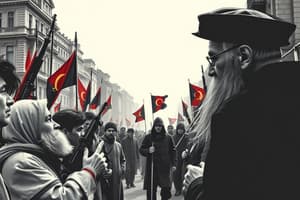Podcast
Questions and Answers
What is class conflict theory?
What is class conflict theory?
- A perspective that supports social harmony without conflict
- A theory that ignores economic inequalities
- The belief that class conflict is necessary to produce social change and better society (correct)
- The idea that class conflict is irrelevant for social progress
What does class conflict refer to?
What does class conflict refer to?
The struggle between capitalists (bourgeoisie) and the working class (proletariat)
Karl Marx's Socialist Revolution suggests that the working class will inevitably overthrow the capitalists and redistribute the wealth.
Karl Marx's Socialist Revolution suggests that the working class will inevitably overthrow the capitalists and redistribute the wealth.
True (A)
Karl Marx believed that the economic system rewarded those who could generate their own ______.
Karl Marx believed that the economic system rewarded those who could generate their own ______.
What historical event was influenced by Lenin's inspiration from Karl Marx's conflict theory?
What historical event was influenced by Lenin's inspiration from Karl Marx's conflict theory?
What is Russian Communism in relation to Karl Marx?
What is Russian Communism in relation to Karl Marx?
Flashcards are hidden until you start studying
Study Notes
Class Conflict Theory
- Class conflict is essential for driving social change, leading to advancements in society.
- The theory posits that tension shapes progress and innovation within society.
Class Conflict
- Characterized by the ongoing struggle between two primary classes: capitalists (bourgeoisie) and the working class (proletariat).
- This dynamic creates a framework for understanding economic and social disparities.
Karl Marx's Socialist Revolution
- Marx theorized that the working class is destined to rise against the capitalists to reclaim and redistribute wealth.
- This revolution aims for a more equitable society through the dismantling of capitalist structures.
Economic System Beliefs
- Marx argued that the economic system should reward individuals who can create their own income rather than perpetuating the existing inequalities.
- His views called for a reassessment of value creation in society.
Russian Communism
- Lenin adopted Marx's conflict theory principles, leading to the Russian Revolution of 1917.
- This revolution aimed to establish a communist state, reflecting the broader ideals of Marx's theory on class struggle.
Studying That Suits You
Use AI to generate personalized quizzes and flashcards to suit your learning preferences.




